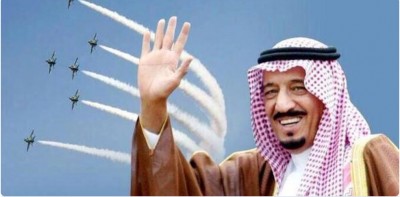What Yemen War? Saudi King Salman Awarded ‘Personality of the Year’

Saudi Arabia’s King Salman bin Abdelaziz was declared the “Islamic World’s Personality of the Year” by a group of religious scholars in Pakistan, honouring the royal for his apparent services to the Muslim world.
Scholars at the Message of Islam Conference in Lahore lauded the king’s “role in uniting the Muslim Ummah” and pointed to efforts in supporting Palestine.
They referred to comments King Salman made during the 29th annual Arab League summit in Riyadh last month, in which he pushed for a tough, unified stance against Riyadh’s regional arch-foe Iran and criticised President Donald Trump‘s decision to move the US embassy in Israel from Tel Aviv to Jerusalem.
The royal also announced a $150 million donation for East Jerusalem “to support the administration of Jerusalem’s Islamic property”.
But while Saudi Arabia and Israel have no formal diplomatic relations, a series of statements and reports of covert meetings between Israeli and Saudi officials in the last two years gives an impression of a rapprochement – including opening the kingdom’s airspace to flights bound for Israel.
Observers say any open alliance between Saudi Arabia and Israel would signal Riyadh’s abandonment of the Palestinian cause.
Both Israel and Saudi Arabia see Iran as their biggest outside threat and the United States as their key ally, but the Saudi public and media have previously been heavily critical of Israeli treatment of Palestinians.
Recently a number of media outlets have begun painting Israel in a reasonable light while demonising Iran.
Also, a document leaked by Lebanese newspaper close to Hizballah, allegedly from the Saudi foreign ministry, detailed concessions to Israel including Saudi encouragement of the Palestinians to cede the right of return of their refugees, in return for closer cooperation with Tel Aviv against Iran and Hizballah.
Deadly war
But aside from Saudi’s emerging relationship with Israel, the kingdom has been embroiled in a deadly war with neighbouring Yemen for the last three years.
Saudi Arabia formed a coalition to battle against Houthi rebels, allegedly backed by Iran, who took over most of the north including the capital Sanaa in September 2014.
The coalition launched a military campaign to push back the rebels and restore the internationally recognised government to power, but has been heavily criticised by rights groups and the international community for its mounting civilian casualties.
In October the United Nations placed the Saudi alliance on a “blacklist” for killing and maiming children.
On Sunday, at least 88 people were killed, including the bride, when a coalition double-tap raid struck a wedding celebration in the northern Hajjah province.
Just a day later, 9 civilians were killed when an airstrike struck the al-Warqi petrol station in the same province.
Along with its air campaign, the Saudi-led coalition has imposed periodic blockades on Yemen’s ports. Both actions have killed more than 10,000 people – most of them civilians – and have left more than 18 million in need of aid, according to the UN.
The Saudi-led coalition’s war against Houthi rebels has led to the “world’s worst humanitarian crisis”, the UN said.

